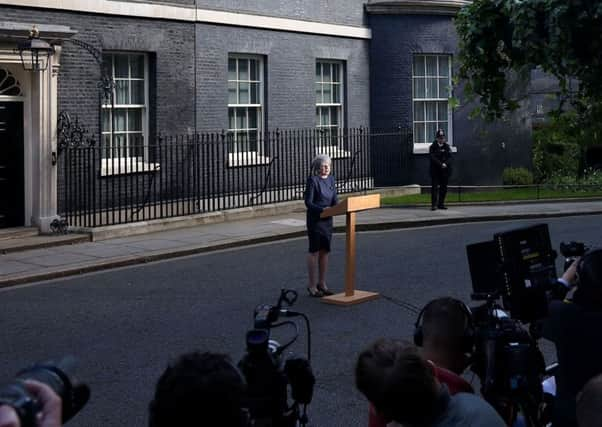Chaos in Brexit and care homes are linked to 2016 poll shambles


Here is why.
The prime minister’s decision last year to call a snap general election turned out disastrously for the Conservatives. It is fashionable to sneer at her rash action.
But that overlooks the fact that in early 2017, when Mrs May suddenly decided on the poll, Labour Party polling was the lowest it had been since World War II, lower even than the 27.6% that the party got in 1983 under the leftist Michael Foot.
Advertisement
Hide AdAdvertisement
Hide AdGordon Brown, remember, was deemed to lack courage when he decided against a similar snap general election in 2007, after he took over from Tony Blair (he came close to calling one, then bottled it).
Jeremy Corbyn’s stock was so low at the beginning of last year, with his own backbenchers openly snubbing him in Parliament, that Mrs May had good reason to conclude that she had perhaps the best political chance in decades to secure a big Westminster majority.
Such a result would have made the EU negotiations far more straightforward. A full Brexit, with the UK leaving the single market and customs union, would probably have ensued, regardless of what Dublin thought (and regardless perhaps of unionists too).
There are a number of reasons why Mrs May did not win that overall majority, but the ‘dementia tax’ debacle was clearly a factor.
Advertisement
Hide AdAdvertisement
Hide AdThat policy — that people would have to pay for care provision if they had assets in excess of £100,000 — was immediately subject to scorn.
If an elderly person has a total estate of, say, £200,000 (made up of house and other assets) and they had to go into a care home, their assets would have to fall to £100,000 before the state would pay (at present people are liable if they have assets above £23,000, but their house is not counted if they get care at home).
The prospect of losing a future inheritance caused uproar in middle England, and Mrs May beat a humiliating retreat from the plan.
Even if the fallout cost her only, say, 10 lost seats, it was enough to deprive her of an overall majority.
Advertisement
Hide AdAdvertisement
Hide AdSince that result, Brexit negotiations have barely limped forward. Now, after the recent complicated amendment debates and after bitter rows among MPs, the talks seem to be in such a state of paralysis that is increasingly hard to see an outcome other than the much mocked ‘Brexit In Name Only’ (BINO).
Never in my lifetime can I recall a major western power being in a parallel humiliating position to the one in which Britain finds itself.
Yet the social care policy was a rare and brave political attempt to tackle the massive challenge that we face in care costs, as people live ever longer.
I do not know known enough about Dunmurry Manor, which has been in the news this week, to comment on the standard of care there.
Advertisement
Hide AdAdvertisement
Hide AdThe Commissioner for Older People says one thing, the Regulation Quality and Improvement Authority experts say another.
But we can confidently say that in the current circumstances of rapidly growing demand for elderly care, accompanied with a refusal to pay for it, by the public and therefore by political parties, that there will be plenty of stories of chaotic care in the decades ahead.
We must talk honestly about this, and consider funding options such as continuing to pay national insurance if you have the good health to be able to work past state retirement age.
In Northern Ireland, politicians finally agreed, on cross party basis in 2016, to act on NHS reform only when the alternative was disaster.
Advertisement
Hide AdAdvertisement
Hide AdThis week I interviewed Professor Rafael Bengoa, the Spanish doctor and health expert, who was back in NI to discuss implementation of his 2016 report, which concluded (among other things) that the Province has too many hospitals.
There had been political cowardice on this matter for decades. The late civil servant Maurice Hayes chaired a review that reached similar conclusions in 2001.
The opposition comes from us, the general public. Furious protests emerge whenever a local hospital is mooted for closure, but often these closures allow services to be concentrated in a smaller number of first-rate hospitals which have concentrations of expertise, and thus higher survival rates.
As another health expert that I interviewed years ago put it: ‘Save Our Hospital’ campaigns should be entitled ‘Save Our (Inadequate) Hospital’.
• My interview with Prof Bengoa will appear during the week
• Ben Lowry (@BenLowry2) is News Letter deputy editor